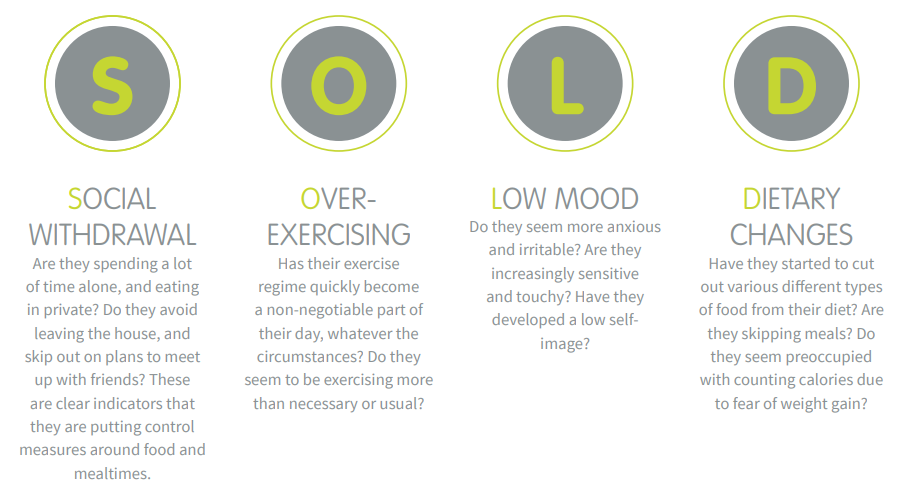Greetings to all our readers
Welcome to the Autumn edition of the Safeguarding Newsletter from the MITSkills Safeguarding Team. We aim to bring you all the latest, relevant help and advice on issues we feel will be of importance to you. In this issue, we talk about eating disorders due to the worrying rise in youth dieting in order to conform with social media stereotyping.
Eating Disorders – What is an eating disorder
An eating disorder is a mental illness that can have a significant effect on your health and wellbeing. The term refers to a potentially life-threatening condition, that is characterised by disturbances in eating, emotional and psychological distress, and physical symptoms. Eating disorders can be seen as a way of coping with emotional distress, or as a symptom of other underlying issues.
The current categories for eating disorders are: Anorexia Nervosa, Bulimia Nervosa, and Binge Eating disorder. All of these – as well as others Feeding and Eating Disorders Not Elsewhere Classified (FEDNEC), are concerned with control of weight and shape.
Just because somebody doesn’t fit in absolutely with one particular category doesn’t mean they don’t have an eating disorder. Other conditions include compulsive eating, ARFID (avoidant restrictive food intake disorder) types of anorexia and bulimia which are not severe, Night Eating Syndrome, and Orthorexia, which is thought to be similar to anorexia.
If you’re concerned that someone you know could have an eating disorder, then aside from obvious signs like fluctuations in weight, you might have noticed some changes to their relationship with food, exercise, and social interactions.

How to spot the early signs of an Eating Disorder
If you’re concerned that someone you know could have an eating disorder, then aside from obvious signs like
fluctuations in weight, you might have noticed some changes to their relationship with food, exercise, and social
interactions.
Keep a tab on all possible symptoms with the handy acronym, ‘SOLD’:

Eating Disorder Myths
False information and misconceptions are pretty common in the world of eating disorders – so it’s important to be aware of them, and be able to tell facts from fiction.
Here’s an example of some key eating disorder myths that we’ve busted wide open:
“You’re not thin enough to have an ED”
False – eating disorders come in all shapes and sizes. As serious psychological illnesses, they cannot be fully assessed based on solely physical measures such as weight and shape.
In fact, most people with an eating disorder are not underweight, so it’s not possible to tell whether someone has one just by looking at them.
“Only females develop Eating Disorders”
Totally wrong – eating disorders develop from low self-esteem, which is rife in both men and women. In fact, according to a 2019 survey conducted by NHS England, approximately one in eight of the men who took part screened positive for a possible eating disorder.
While women with anorexia typically restrict their food in order to lose weight, men are more likely to aspire for building muscle and attaining the certain aesthetic body shapes that are promoted on Instagram and other social media. Rather than restricting, men therefore typically binge eat and then purge, as well as exercise excessively, and misuse steroids.
“Eating Disorder behaviours only focus on food”
Not at all. Individuals with eating disorders generally have an unhealthy focus on food, shape and weight – but it’s important to be aware that the symptoms of an eating disorder can extend far beyond food. Scientific studies have shown links between eating disorders and obsessive traits like perfectionism in school or sports performance.
“Once someone with anorexia gains weight, they will be fine”
No – this is just the first step. Once an anorexia sufferer has returned to a weight that is healthy for them, this means they usually can participate more fully and meaningfully in psychotherapy.
In these sessions, they will address the emotions behind their disorder, and come up with healthier coping strategies that they can rely on in times of stress – instead of turning to eating disorder behaviours. Weight recovery alone does not mean the eating disorder is cured.
“My loved one has bulimia, so they won’t develop another type of Eating Disorder”
Unfortunately, this isn’t necessarily the case. Many people with eating disorders will suffer from more than one disorder before they ultimately recover. Some individuals show signs of both anorexia and bulimia simultaneously – for example, regularly binge eating, and then purging while retaining a critically low weight.

What are the risks of dieting?
Short-term side effects of dieting:
- Low energy due to low blood sugar
- Excessive preoccupation with food, and feelings of being out of control around food
- Low mood and irritability
- Food restriction can lead to binge eating, which can lead to feelings of guilt and shame
Long-term side effects of dieting:
- Loss of muscle mass
- Hormonal imbalances (loss of menstrual cycle)
- Increased stress levels within the body
- Increased anxiety
- Slowed digestion – due to low intake of food which can result in constipation
- A slowed metabolism rate (your body will require fewer calories in order to function)
- Some diets restrict certain nutrients, such as carbohydrates, or complete food groups like dairy. When you aren’t eating balanced meals, you are probably missing out on some essential nutrients that can lead to deficiencies.
- Feeling cold all the time
- Loss of physical hunger cues
For more information, please click the link below:
https://www.thesafeguardingcompany.com/media/jubb2gnb/jenup-16-eating-disorder-toolkit.pdf
MIT Safeguarding Team
The MITSkills Safeguarding Team have been trained to an advanced level on all aspects of safeguarding. The team is available to any student, parent, or staff member to discuss and report any safeguarding concerns.
The Team Members are as follows:

Company Safeguarding
Officer
Claire Clark
Call-01932 341416

Company Safeguarding
Lead
Stuart Francis
Call-07716116694

Sport Safeguarding
Lead
Liam Hughes
Call-07510025851
MIT Safeguarding Team Email:
safeguarding@mitskills.com
Additional support available
Mental Health First Aiders
Our trained mental health first aiders are the point of contact for anyone who is experiencing a mental health issue or emotional distress. This interaction could range from having an initial conversation through to supporting the person to get appropriate help.
In a crisis, our Mental Health First Aiders can provide early intervention help for someone who may be developing a mental health issue. Our Mental Health First Aiders are not trained therapists or psychiatrists, but they can offer initial support through non-judgemental listening and guidance.
To access this support email either Iva.Icheva@mitskills.com , Liam.Hughes@mitskills.com or stuart.francis@mitskills.com for an informal non-judgemental chat.
Support Helplines London

Support Helplines Rotherham and Humber

Support Helplines in West Yorkshire

General UK wide helplines

